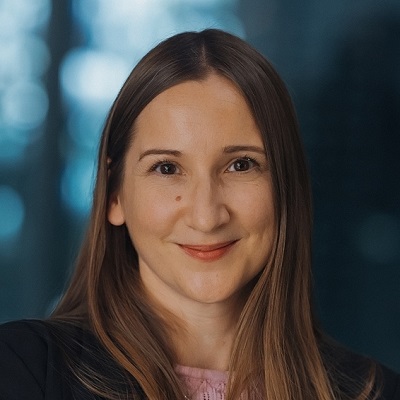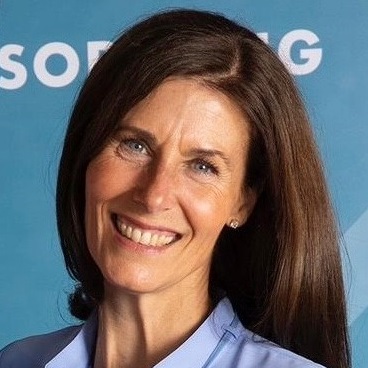ePAG interviews
ERN GENTURIS spotlights - ePAG interviews
In the spotlights: Darja Molan
Posted on 2 June 2025
Name: Darja Molan 
City: Ljubljana, Slovenia
Could you tell us about your background?
I obtained a Bachelor of Science in electrical engineering and was always certain I would work in my field, but everything changed when I was diagnosed with triple-negative breast cancer at the age of 30. After completing eight rounds of chemotherapy and four surgeries, I wrote and self-published a book about my journey, Vem, da zmoreš, Darja (I Know You Can, Darja). I’ve always felt a strong need to support others going through similar experiences, so I started volunteering at Europa Donna Slovenia. Today, I’m the president of Europa Donna Slovenia, a patient organization that supports women with breast and gynaecological cancers. In addition to providing support, we also raise awareness about breast and gynaecological cancers, advocate for patients’ rights, and are actively involved in EU research projects. Currently, I am the chair of the Patient Council at the Oncology Institute in Ljubljana and the chair of the ERN GENTURIS ePAG.
Could you tell us about your experience as a patient with a genturis (genetic tumour risk syndrome)?
After my diagnosis, I was referred to genetic counselling and testing, and soon I found out I was a BRCA1 mutation carrier. Before receiving my results, I felt well prepared thanks to the clear explanations and support from the genetic counsellor. I chose to have a bilateral mastectomy, and later had my fallopian tubes removed first, followed by my ovaries a few years later. The late effects, especially early menopause, have been challenging, but I believe it was the right decision to lower my cancer risk. My genetic testing also helped save my mother’s life. After I tested positive, she underwent testing as well and was found to carry the mutation. During her preventive surgery, early-stage ovarian cancer was discovered, before any symptoms had appeared. Thanks to on-time testing and good medical care, we have both been disease-free for over ten years. When I was diagnosed with breast cancer, my daughter was only one year old. She’s now 13, and I often wonder if she carries the mutation too and also what will the future bring for her and for other healthy carriers.
What are the main obstacles for genturis patients in your country - how can ERN GENTURIS help?
In Slovenia, genetic testing for high risk and preventive surgeries are covered by insurance, which is great. But it’s not always easy to identify who should be tested. We need more awareness among family doctors. People also need more psychological support after learning they are carriers – that’s when many turn to us, patient organizations for advice and support. ERN GENTURIS can help by connecting us and sharing knowledge across countries on the proper path for HBOC patients and healthy carriers.
What message do you have for the international medical community?
Please keep investing in prevention and support for healthy carriers. We need better access to genetic testing in all countries. Not just the tests themselves, but also high-quality genetic counselling, psychological support, and clear, accessible information. It’s also important to improve the identification of families with inherited mutations, so that those at risk can benefit from appropriate surveillance, support, and personalised preventive options before cancer develops. Genetic risk should be systematically integrated into cancer awareness efforts, including in the European Code Against Cancer. An International Hereditary Cancer Day could help raise awareness and reach more families around the world.
In the spotlights: Georgina Hoffmann
Posted on 22 January 2025
Name: Georgina Hoffmann 
City: Schorndorf, Germany
Could you tell us about your background?
I am originally from Toronto, Canada. I have been living in Germany with my husband and our two sons since 2002. Sports, physical activity and being outdoors is an important aspect of my life, as is plant-based nutrition.
Could you tell us about your experience as a patient with a genturis (genetic tumour risk syndrome)?
I am grateful to be an ePAG with GENTURIS as my life has been heavily impacted by cancer.
My great-grandmother passed away at the age of 43 from breast cancer. My grandmother, developed colon cancer at age 44. I was a toddler at the time. Soon thereafter, my mother and her three sisters were diagnosed with cancer, as well. The C-word had become a regular topic of discussion at our family’s dinner table.
An article about hereditary cancer in the newspaper in the late 1980s prompted my mother to call our family doctor. He arranged for a consultation by a geneticist. We learned about the possibility of the so-called ‘Lynch Syndrome’ gene mutation running in our family. This important meeting convinced us to join a study by the Ontario Familial Colorectal Cancer Registry (OFCCR) in Toronto, Canada. We became one of the first families in this new genetic research program for Lynch Syndrome.
In May 2018, at the age of 47 I underwent surgery for an aggressive and fast growing ovarian cancer. A small water cyst the size of a pea had grown to a grapefruit size tumour in just fourteen months. The complete hysterectomy resulted in life-altering surgical menopause which continues to challenge me today.
In December 2021, I had a Hemicolectomy surgery for a new primary cancer tumor in my ascending colon. Nine days later, a second colon operation was performed on January 1, 2022 due to a perforated anastomosis and sepsis infection in my abdominal cavity. The pathology results indicated that cancer was present in some lymph nodes. I was eligible to join an immunotherapy therapy study in which I received an infusion of Atezolizumab biweekly for one year.
Since the beginning of my own cancer journey I have been given many conflicting recommendations for therapy from different experts. I am incredibly thankful for the great strides in cancer therapy treatment for Lynch Syndrome patients.
What are the main obstacles for genturis patients in your country - how can ERN GENTURIS help?
I believe that the main obstacle for Lynch Syndrome patients is the focus on standard procedures based on the location where a tumor is discovered, rather than the importance of the genetic origination and a specific treatment. As a result the latest findings for Lynch patients with MSI-high tumor mutations are not always applied. I am confident that ERN GENTURIS can change standard procedures by incorporating precision medicine. This would be more efficient and more effective for both the doctor and the patient.
What message do you have for the international medical community?
My first message is: Thank you for the research and collaboration worldwide in genetics and cancer.
My second message or impulse is to encourage more research regarding two areas: genetic polymorphisms (e.g. COMT, MTHFR) and the microbiome (e.g. Akkermansia muciniphila). A better understanding of these areas could provide important insights into the immune system of Lynch Syndrome patients. Early intervention could also mitigate health risks through means of dietary nutrition, nutraceuticals and healthy lifestyle interactions. Identifying different genetic SNP’s, such as cytochrome P450-2D6 could be extremely beneficial for pain management post-surgery. Patients who are newly diagnosed with a genetic mutation are often overwhelmed and desperate for guidance. Precision or personalized medicine as a standard in the future could play a key role in empowering patients with their health challenges.
This perspective for me as a patient, makes me very optimistic and hopeful for a healthy and happy future!